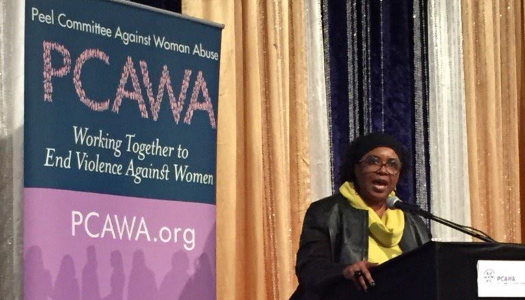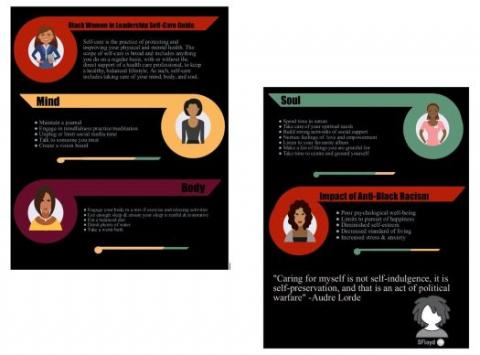Affirming Black Lives in Leadership

A Self-Care Guide for Black Women in Leadership
Caring for myself is not self-indulgence, it is self-preservation, and that is an act of political warfare.
~Audre Lorde
As part of my Master of Arts in Leadership degree through Royal Roads University, I was required to engage in an action-oriented inquiry that would contribute to positive change. I took a first-person action research approach to my engaged leadership project (ELP) because of challenges encountered due to the COVID-19 pandemic.
Many times in my life I have been fortunate enough to lean into challenges and embrace them as potential opportunities. COVID challenges led to an opportunity to conduct research about who I am as a Black feminist mother and how this informs how I show up as a leader in the violence against women sector and in the community as a whole.
Recognizing the powerful role of self is critical in the feminist leadership context because women’s psychic structures have been constructed not only through the usual institutions, socialization process and experiences (like family, school, peers, etc.), but through the particular nature of the patriarchal structures in which they have lived and the oppressions they have consequently negotiated. (Batliwala, 2010, p. 31)
I embraced the opportunity to explore how I can leverage knowledge about self within a larger system to influence social change.
Leadership to Eliminate Violence Against Women and Their Children
Eliminating violence against women on a systemic level involves challenging patriarchy, misogyny, racism, and discrimination in all its forms. As such, working from an intersectional, feminist leadership perspective with anti-racist and anti-oppression values is integral to creating long-term systemic change for women and their children who experience violence.
As Coghlan (2019) outlined, first-person action research focuses on self rather than others and the ability to challenge one’s own approach to life and leadership. I chose to inquire into how I could create change within the Region of Peel systems in which I work. To explore this further, I invited my colleagues to participate in an online survey, maintained a written and voice note journal for six weeks, and engaged in a series of interviews with subject matter experts and feedback partners.
My research helped me to understand the values demonstrated in my leadership and how I can continue to foster these values and show up as my authentic self when collaborating with systems that may not share my values or the values of my organization. As Jackson and Parry (2018) asserted, “Authentic leaders . . . know who they are, what they believe, what their values are, and that they can act upon these values and beliefs” (p. 110). This research contributed to my journey as an authentic leader.
Recommendations for Black Leaders, Including Myself
This study resulted in recommendations for meaningful steps that I—and indeed, all Black women leaders—can take when working in collaboration with others who may not share our values or the values of the organization they represent. The recommendations are:
1. Find allies—people who I can trust who also share my vision as well as my feminist, anti-racist, and anti-oppression values.
2. Establish an ongoing practice of self-care.
3. Create or join a strong network of Black women leaders.

The recommendations are practical yet critical to sustaining self as I push for social justice and social change. The recommendations are also essential for affirming Black Lives in Leadership.
To hear an interview with Sharon recorded on International Women’s Day (Monday, March 8, 2021), please click here.
To hear Sharon speak on a panel titled, “Online Community Organizing and Coalition Leadership in a Pandemic,” click here.
To access a copy of Sharon's self-care guide, click here.
References
Batliwala, S. (2010). Feminist leadership for social transformation: Clearing the conceptual cloud. https://justassociates.org/sites/justassociates.org/files/feminist-leadership-clearing-conceptual-cloud-srilatha-batliwala.pdf
Coghlan, D. (2019). Doing action research in your own organization (5th ed.). SAGE.
Jackson, B., & Parry, K. (2018). A very short, fairly interesting and reasonably cheap book about studying leadership (3rd ed.). SAGE.
Lorde, A. (2017). A burst of light and other essays. Ixia Press.